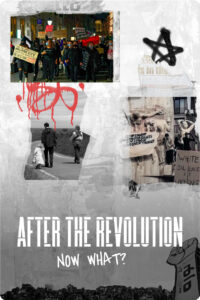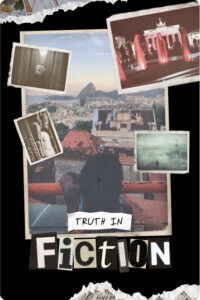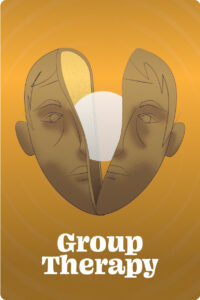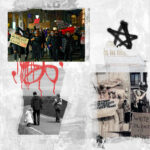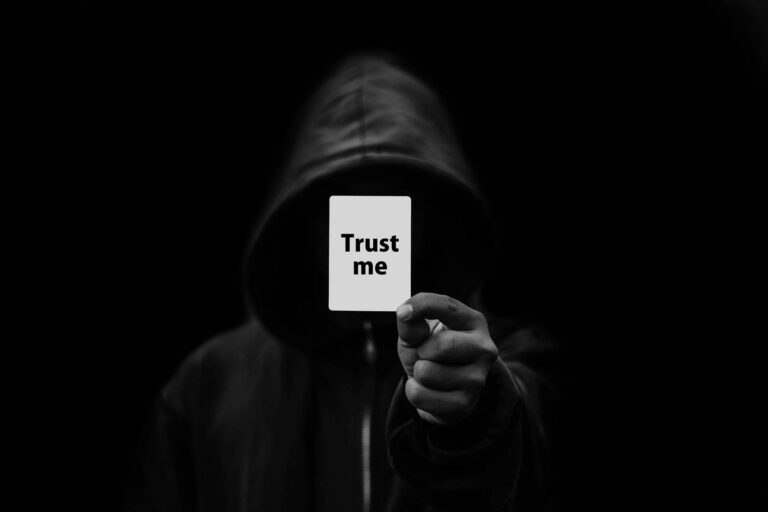July 2023
“Your alarm’s ringing!” I pretend not to hear. My roommate, who constantly groans about my bad habit of letting my alarm go off every ten minutes instead of getting up (or simply shutting it off), pounds on my bedroom door: “Diadié! Your alarm keeps going off! Do something about it, would you please?”. In his exasperated plea with anger bubbling to the surface, I hear him say, “If you don’t do something about it, I’ll take your phone and throw it out the window.” He has every right to be upset. My eyes are scrunched closed. I rub them. My roommate’s shadow moves away from the door and appears suddenly at my nightstand. I open my eyes and swipe my finger across my phone screen. In a slow, half-hearted movement, I sit up. My roommate returns to his bedroom, slamming the door behind him.
My first reflex after my alarm goes off is to quickly check my Facebook notifications, stumbling toward the bathroom. In the time it takes me to get there, I’ve already read a short news article. So it’s official, then: following a referendum held the month prior, a language present in the vast Sahel region has been demoted. Although not yet a dead language (for those who like to debate about languages going extinct), the referendum relegated the French language to the absurd status of a working language.
For those who haven’t been following the story, this is a case of constitutional manipulation. A transitional government has upended fundamental laws to grant amnesty to its leaders while reshaping the legal framework. What was recently just an illusion has now become reality. We can now spew about France, Europe, and even our neighbors suspected of malicious acts in our newly-declared-official national languages.
The news hits me like the guillotine that decapitated a certain French king after the Revolution of 1789. Reeling from the shock of this news, I do a rapidfire Google search for other related news and find two articles who make mention of the events. I don’t have time to finish reading; I’m already running late for work and need to shower.
So it’s official, then : following a referendum held the month prior, a language present in the vast Sahel region has been demoted […] The referendum relegated the French language to the absurd status of a working language
End of September, 2023
At night, the nightmares often transport him beneath a burning sky. He witnesses the gaping wounds of a people damaged by decades of mistreatment, boats sinking to the river bottoms, bloodthirsty kings cursing the serfs moaning in agony…the never-ending disorder of a lost country.
For the past few days, I’ve been writing exclusively in urban Bambara, a hybrid language that mixes traditional Bambara from the villages around Bamako with elements of various international languages flooding in daily from the arrival hall of the Bamako-Senou airport. On the eve of the national holiday, I decided to run a survey with my Facebook “friends” about using Bambara in everyday life. The reactions are swift, ranging from shock to understanding. Some of my French friends are appalled and confused by this recent habit of mine, sending me lengthy private messages to express their bewilderment. Among them, two or three recognize it as a fair riposte, since many people (unlike them, who are among the elite of the French-speaking world) simply don’t understand the French language or speak it poorly and struggle to be understood. That said, many of my Facebook friends wonder about the change, speculating that I’m risking my identity amid this diplomatic crisis between French and Malian leaders. I explain that this isn’t a radical shift or a political statement, but rather a virtual illustration of everyday trilingualism. In truth, nothing has changed—I use all three languages daily with my family, friends, and passersby in the streets of Saint-Denis, so I might as well do so online. But it’s a lost cause!
They may be wrong to have been so quick to judge, as the issue they seek isn’t rooted in a current conflict but in an age-old struggle that other French-speaking Africans—artists, politicians, or ordinary citizens of this “double geographical space”—have faced. After all, I’ve always written novels in French, which are published and well-received in the Parisian literary scene. In other words, I’m helping to spread the French language worldwide when I should have been using the language of my heritage, my supposed mother tongue: Soninke. I write in French using the tools and strategies of white writing, a labyrinthine approach designed to show a clean slate, page after page. But no matter how much I try to reinvent French, infuse it with Soninke or Bambara morphology, or find a way to make it uniquely mine, one fact remains: I am a francophone writer.
Despite my attempts to write in Soninke and Bambara—whether through poetic prose, short stories, or the retelling of ancient lore—I find myself lacking the necessary writing skills, thoughts and words colliding with the impossibility of leaving a written trace behind.
With national languages now becoming official, could this be a chance to reintroduce the written form of these national languages that I happen to also speak fluently? Amidst this jumble of thoughts, I receive word from a former Soninke professor of mine from INALCO (Paris, France). He tells me that he has kept up to date on my various publications, noting that there are a few grammatical errors in them. He then shares his number with me so we can get together and discuss spelling conventions.
Five years ago, nearly six, when I started improving my knowledge of Soninke typography by way of the Latin alphabet (due to the absence of the N’ko alphabet), he was the person I had contacted to find a Soninke instructor. At that time, I had the opportunity to audit an introductory course. Although the classes I attended lasted only one semester, it was ample time for me to want to abandon the endeavor altogether. Soninke spelling conventions appeared overly technical to me and not particularly suited for practical use. What’s the use of relearning a language I already speak solely for the purpose of writing?
End of October 2023
A month elapses before our meeting is finally scheduled. We meet at the “Au père tranquille” bar in Paris, greeting each other with a firm handshake. He’s an elegant man with the cheerful expression of a retiree, his past career reflecting that of a cooperative worker passionate about project development. After placing our orders, he gives me a packet of documents and shows me some learning manuals. When he discusses his experience in Mali during the 1970s and 1980s through literacy programs, I listen with interest, but can’t shake the image of him—a fair-skinned Frenchman—standing there among Malian peasants, clad in khaki attire and tall black boots. I quickly dismiss the stereotypical image forming in my mind and focus on his voice instead.
His conclusions are clear: “The official spelling of Malian languages is too scientific and not well adapted for modern usage.” Finally, someone who agrees with me, I think to myself. He continues: “The use of the phonetic alphabet, which requires a special keyboard, is still an obstacle for many people,” he remarks bitterly. He then launches into a series of examples on possible phonetic transcripts, all of which my mind refuses to absorb. By the time the server brings the order, our conversation has drifted to the topic of political dimensions of language in written form and how the position that various languages take is justified by their relationship to France. He maintains that “defenders of the scientific method, the winners of this battle, wanted to avoid anything resembling the alphabet used in France, with their intention being to create a distinctly Malian model—or at the very least an African one, based on their criteria.” I can no longer recall the dates, the names of the key figures, or the cities where the conferences and symposia were held. However, we both agree on one thing: the motivations of the various parties differed, and their profiles quickly became clear.
The neo-sovereignist contempt is understandable. For years, French was mistakenly portrayed as a crucial prerequisite for elite status, when in fact, it was merely one of several pathways to knowledge, alongside languages like English, Arabic, or Spanish, all of which are scholarly languages.
I tell him about the current personas that now carry the torch, passed down from previous generations. Among them are the neo-sovereignists, who are obsessed with cultural authenticity and reject anything in the language that might have a Western influence. If we listened to the neo-sovereignists, French-speaking graduates would be considered obsolete, burned in a bonfire of newfound freedom accompanied by a brass band playing the national anthem, as they have long been used as puppets by Westernized individuals completely disconnected with reality.
The neo-sovereignist contempt is understandable. For years, French was mistakenly portrayed as a crucial prerequisite for elite status, when in fact, it was merely one of several pathways to knowledge, alongside languages like English, Arabic, or Spanish, all of which are scholarly languages. Consequently, anyone who didn’t possess or seem to master French was ostracized from public office or significant political positions. It’s only natural, then, that neo-sovereignists view this change as a form of revenge, a just return. However, even among the French, simply speaking the language doesn’t necessarily make you “somebody.”
On the other hand, moderate nationalists (if such a thing can exist) are eagerly anticipating the emergence of prestigious schools and institutes offering courses entirely in official “national” languages. In these institutions, students would be free to write their dissertations or doctoral theses in Bamanan, Fulfuldé, or Tamasheq, causing the enemies of our authenticity to tremble at the influx of unfamiliar words into their dictionaries, as if heralding a new linguistic battleground.
The only kind of person I’d disagree with on the topic would be your average bourgeois intellectual. Excuse me, let me rephrase that in less Marxist terms before I get accused of collaboration with the Western enemy: what I mean is the average member of the so-called intellectual elite, who has built his or her prestige and popularity on the use of French language. Then, upon awakening with a great thirst to reaffirm full African identity, this person voluntarily embraces the new linguistic configuration. From their Californian duplex or his Parisian apartment, in between emails written in English and chapters of a feel-good novel in Russian, they encourage people to support this linguistic change, as if it somehow represents their sovereignty in the face of French imperialism. In the process, they also manage to win over the semi-literate reader who most likely lives in Europe and whose main goal in life is to be “Videoman.” And together, the two form an improbable but effective duo, making live appearances on social networks sitting in front of a large Malian flag, with the primary goal of creating a deluge of nationalist identity, aiming to confine others inside a linguistic prison. Meanwhile, they continue to send their own children to expensive international schools.
Help us tell the world to you !
Frictions is launching its club : by supporting Frictions, you’ll be supporting a community of authors and journalists who tell the world through intimate stories!

The professor redirects me to the main question at hand: “What if our digital practices prevailed over academic discipline?” I feel optimistic, as if suddenly, we might take a cue from Senegalese people who predominantly use Wolof in their social media conversations. It’s a bit frustrating for us because not understanding the language means we’re missing out on important news. The professor encourages me to persevere in this direction. I bid him farewell, and here I am, embarking again with the mission of bambarizing the internet.
In any case, if we were to truly reduce the French language to a colonial relic that must be discarded, then we can promptly eliminate any words influenced by French from our daily vocabulary. Despite potential accusations of cowardice, we should confront this change with our own linguists and language experts, whose primary task will be to promote all the scientific and literary neologisms developed within their language research and development centers.
We, the unfortunate writers of this unpopular tongue, who persist in celebrating the language of the former invader now deemed as our adversary, are caught in an ongoing struggle. Which language truly belongs to us?

